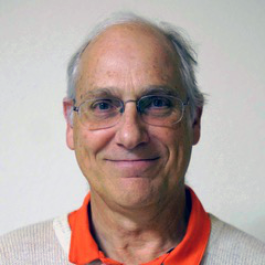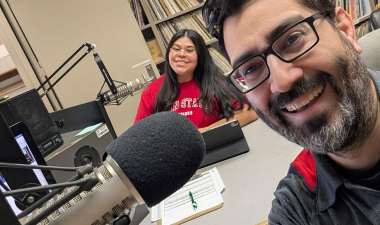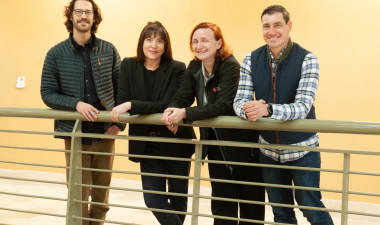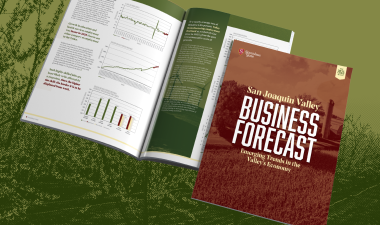
Harold Stanislaw serves as the undergraduate studies coordinator for Stanislaus State’s Department of Psychology, but the long-time professor’s latest research project will focus on master’s students.
Specifically, a $954,032 grant from the National Science Foundation will fund the Well-Being Alliance for Research Masters (WARM) to study the potential impact of STEM master’s candidates’ well-being on academic outcomes. The project will explore how improving student well-being can boost academic success and help them thrive in STEM fields.
“One of the big mysteries for us is how this all relates to academic performance and whether addressing well-being will help more students complete their degrees or complete them faster,” Stanislaw said. “We think so, but there’s no good data on that anywhere.”
The “we” Stanislaw refers to includes professors from other member California State University campuses — partnering with additional campuses allows for a larger pool of students to participate in the study. The NSF includes behavioral sciences in its definition of STEM, and only Stan State’s approximately 100 psychology master’s students and a half-dozen biological sciences candidates qualified for the study.
Stanislaw contacted Frank Gomez, executive director of STEM-NET at the CSU Office of the Chancellor, to enlist fellow campuses, ensuring a more diverse sample that reflects the CSU’s demographics and the communities it serves.
Gabriela Chavira, professor of psychology at California State University, Northridge; Jessica Morales-Chicas, who teaches in the Department of Child and Family Studies at Cal State LA and Amanda Morrison, professor of psychology at Cal State East Bay, joined Stanislaw and Stan State Professor of Biological Sciences Matthew Cover as co-principal investigators (co-PIs). Others on campus — whether counselors, faculty or staff — are invited to get involved, Stanislaw said.
Stanislaw began examining student well-being a few years back when a Turlock company called Seity developed an app to measure the well-being of K-12 students and asked Stanislaw to evaluate the app's questions.
“School kids access it every day and report on their well-being just by clicking on four things,” Stanislaw said, noting it’s used for those in grades 7 through 12. “The app asks what their energy is like, their sense of belonging, their joy and their sense of direction and purpose. You report that using a happy face scale to respond.”
School counselors can monitor responses to determine if there’s a concerning trend in students’ responses.
Stanislaw and colleagues at Cal Poly in San Luis Obispo considered applying it to higher education students, and he learned of the NSF grant last year while attending a conference in Philadelphia.
“I got really excited about it because I think the key is figuring out how our grad students are doing in terms of their well-being and what we can do to help them if they have issues,” he said. “I’m also excited about it because there’s not a lot of funding for grad students.
“In the CSU, grad students are a pretty large population, but we don’t hear much about them. We have a good sense of what our undergrad students need but not so much our grad students, and they might be different.”
The app will not work like the one for K-12 students. No one will monitor individual results; instead, the team will look at trends.
Stanislaw said the college app will be programmed to provide information about campus and community services, such as counseling or identity spaces.
Another component of the study will be a lengthier questionnaire sent to students each semester to provide some quantitative information.
Student advisory councils will be set up on each campus so students can share their peers’ concerns and provide qualitative feedback throughout the semester. Students serving on the council will receive a small stipend.
“It’s not huge, but we’re hoping the combination of that and their ability to bring voice to some of the graduate students’ concerns out there will get some students interested in participating,” Stanislaw said. “Part of this is getting students and faculty to recognize it’s not just about graduate studies coursework. It’s also about people as humans and understanding what’s going on with them in terms of their mental well-being and mental health. Let’s see what we can do and see if there are issues we need to be aware of.”
While serving as a coach at the Writing Center for graduate students at one time, Stanislaw noticed students did very little writing. Instead, they talked to each other about their programs, issues they faced and problems they had. He hopes a similar space can be created to allow students to communicate similarly.
Stanislaw said the study will work to provide students with the means to succeed and identify ways the University can improve its practices to improve student well-being.
The four-year project begins Oct. 1, with the first year planned as a developmental stage. Stan State will be the first to implement the app because of Stanislaw’s familiarity with it. Each campus co-PI will spend the year learning to use the app and mapping the resources available to their students. The second and third years will involve actively monitoring students at all four universities, and the fourth year will focus on evaluating the results.
“Hopefully, we’ll establish a good rapport between the students and faculty involved with running this program so students will feel comfortable being open with us about what they see going on, what their ideas are about the negative things and what the good practices are so we can make sure those are maintained,” Stanislaw said.



